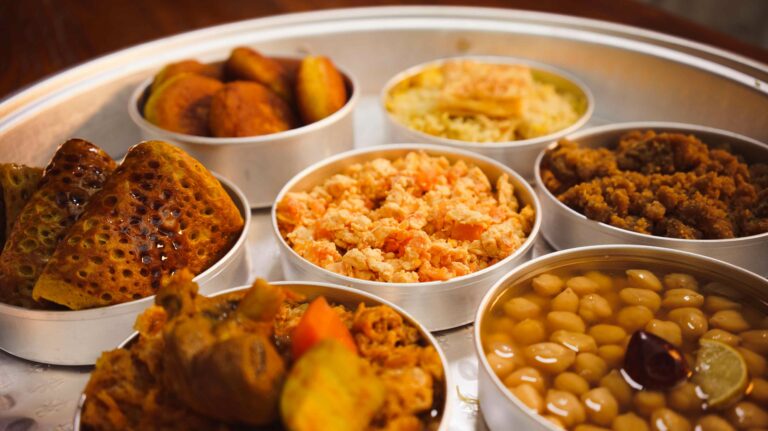Introduction: Emirati cuisine and Bedouin culture
Emirati cuisine is a rich and diverse culinary tradition that reflects the country’s history, geography, and cultural heritage. The cuisine is influenced by various cultures, including Arab, Persian, Indian, and African, but the Bedouin culture is perhaps the most significant. Bedouin refers to the nomadic Arab tribes that have inhabited the Arabian Peninsula for centuries. Their lifestyle and traditions have had a significant impact on Emirati cuisine, shaping its ingredients, cooking techniques, and philosophy.
The nomadic lifestyle and its impact on Emirati cuisine
The Bedouin lifestyle was largely dependent on camel and goat herding, which meant that their diet primarily consisted of milk, meat, and dates. These ingredients have become an essential part of Emirati cuisine and are used in various dishes such as machboos, a spicy rice dish with meat or seafood, and saloona, a vegetable and meat stew. The nomadic lifestyle also meant that the Bedouins had to rely on preservation methods such as drying and smoking to preserve food for long journeys. This has led to the development of dishes such as balaleet, a sweet vermicelli dish made with dates and cardamom, which could be easily transported.
Traditional Bedouin ingredients and cooking techniques
Traditional Bedouin ingredients such as saffron, rosewater, and cardamom are widely used in Emirati cuisine, adding a unique flavor and aroma to dishes. Cooking techniques such as slow-cooking, grilling, and baking in underground ovens or tandoors have also been adopted in Emirati cuisine. The Bedouins used to cook in communal pots called degs, where everyone gathered around and shared the food. This communal spirit has influenced Emirati cuisine’s emphasis on hospitality and generosity.
The influence of trade and migration on Emirati cuisine
Trade and migration have also influenced Emirati cuisine, with Indian and Iranian traders bringing spices and ingredients such as saffron, turmeric, and dried fruits. These ingredients have become an integral part of Emirati cuisine, adding depth and complexity to dishes. The Portuguese and British also left their mark on Emirati cuisine, with dishes such as samboosa (samosa) and balaleet having their roots in these cultures.
The role of hospitality in Emirati and Bedouin cuisine
Hospitality is an integral part of Emirati and Bedouin culture and is reflected in their cuisine. Guests are treated with utmost respect and generosity, and no guest leaves without being fed. The Bedouins used to welcome strangers into their tents and offer them food, water, and shelter. This tradition has been carried forward in Emirati cuisine, where hospitality is seen as a sign of respect and honor.
Emirati cuisine today: preserving and evolving Bedouin traditions
Emirati cuisine has evolved over time, but its Bedouin roots have been preserved. Traditional dishes such as machboos, saloona, and thareed (a bread and meat stew) are still popular, but modern techniques and ingredients have been incorporated to create new dishes. Emirati chefs are also experimenting with fusion cuisine, combining Emirati ingredients with international flavors. Despite these changes, the philosophy of hospitality and generosity remains at the heart of Emirati cuisine, reflecting the Bedouin culture’s values and traditions.

